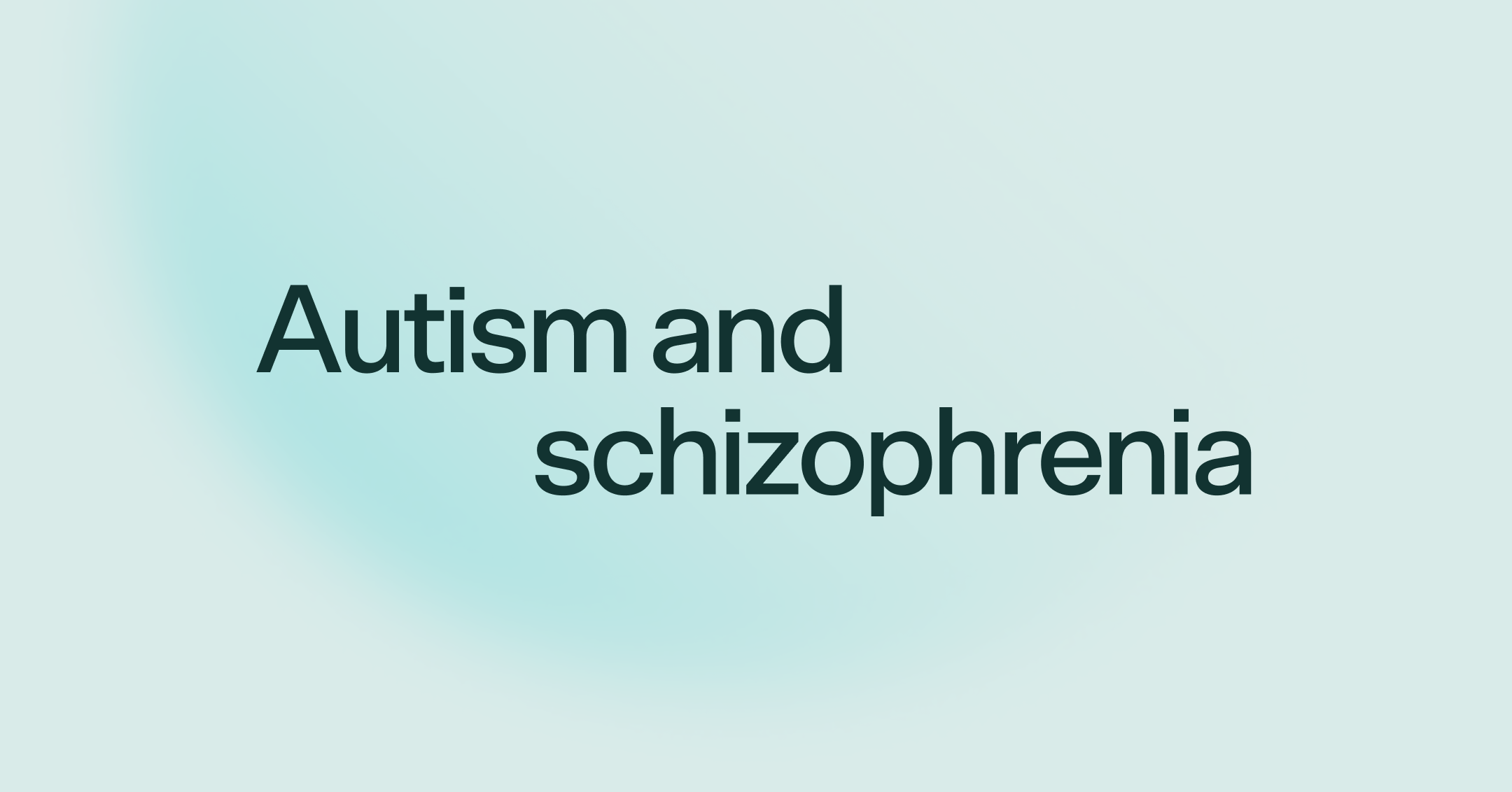Autism and schizophrenia are different mental health conditions. But they have some shared symptoms and risk factors.
Autism does not cause the psychotic symptoms associated with schizophrenia (like hallucinations and delusions). Similarly, schizophrenia doesn’t cause the repetitive behaviors, sensory sensitivities, and restricted interests associated with autism.
If you have both autism and schizophrenia, it’s important to seek integrated care tailored to your unique needs. Providers typically prioritize addressing psychotic symptoms before introducing other forms of support.
Autism spectrum disorder (ASD), or autism, and schizophrenia are two distinct mental health conditions that have some overlapping symptoms and risk factors. Historically, they were once considered the same condition. Autism and schizophrenia can also co-occur.
People with autism appear to be over three times more likely to have schizophrenia than the general population. Researchers are still working to uncover the exact reasons for this connection. But raising awareness about the relationship between these conditions can help ensure that people get the right care for their needs.
Therapy can play an important role in supporting people with autism and schizophrenia by addressing social, emotional, and cognitive challenges. An integrated care approach can help ensure that treatment is tailored to a person’s unique needs, providing support for both conditions.
What science says about the connection
We don’t yet fully understand the connection between schizophrenia and autism. But it appears to be tied to some shared risk factors. These include genetics and differences in the regions of the brain that control social communication and cognition.
Research also suggests that these conditions may, in part, arise from similar environmental risk factors. These include advanced maternal age, birth complications (especially prenatal infections), and adverse childhood experiences.
The care you need, when you need it
Learn how Rula can support your mental health journey
Comparing autism and schizophrenia
In comparing autism and schizophrenia, it may be helpful to review what they have in common and what sets them apart.
What do autism and schizophrenia have in common?
Both autism and schizophrenia can cause significant difficulty with social communication, but the underlying causes are different. This may manifest as:
Discomfort with eye contact
Flat affect (limited facial expressions) and limited use of hand gestures
Inability to understand and respond to others’ emotions
Reduced spontaneous speech and problems maintaining a conversation
A tendency to withdraw from social situations and a preference for spending time alone
How do autism and schizophrenia differ?
Autism and schizophrenia have some distinct symptom patterns, as outlined below. However, keep in mind that it’s possible to have co-occurring autism and schizophrenia, and this can affect a person’s symptoms.
People with schizophrenia may experience psychotic symptoms, like hallucinations (seeing or hearing things that aren’t there) and/or delusions (believing things that aren’t really true). Autism isn’t known to cause psychosis.
The repetitive behavior, restricted interests, and sensory sensitivities commonly associated with autism aren’t recognized symptoms of schizophrenia.
Dig deeper:
Signs of having both schizophrenia and autism
It’s important to remember that autism is a condition that exists on a spectrum, and it doesn’t always require treatment. Many people with this form of neurodivergence lead healthy, productive, happy lives.
However, schizophrenia is a serious, lifelong mental health condition that can significantly affect a person’s ability to function in daily life. Most people with schizophrenia require ongoing professional help to maintain stability and keep themselves safe.
Having both schizophrenia and autism can be a complex experience. It requires integrated care that reflects the symptoms of both conditions (more on that below). People with these conditions are likely to experience challenges with social communication. They may also exhibit autism symptoms (sensory sensitivities, restricted interests, repetitive behavior, etc.) along with symptoms of schizophrenia (odd or unusual behavior, hallucinations, delusions, etc.).
If you think you might have co-occurring autism and schizophrenia, one of the best things you can do is speak with a mental health professional, like a therapist or psychiatrist. They can provide a thorough evaluation to help you better understand the source of your symptoms. And having an accurate diagnosis can help ensure that you receive the right care for your needs.
Seeking treatment for autism and schizophrenia together
Living with both autism and schizophrenia can be challenging. But, with the right support, it’s possible to manage both. These conditions often require long-term care, but the right help can make a big difference in your life.
If you have both autism and schizophrenia, your provider will start by looking at how each condition affects you. If you’re experiencing symptoms of schizophrenia — like hearing voices or having strong beliefs that aren’t true — it might be hard to focus on managing your autism symptoms. In that case, the first goal will be to reduce these symptoms with medication, cognitive behavioral therapy (CBT), family support, and/or self-help groups.
From there, a provider can introduce additional supports that may help you manage symptoms of autism (if needed) and maintain stability. For some people, this could include social skills groups, applied behavioral analysis (ABA), individual therapy, occupational therapy, and any other interventions that could improve daily functioning and quality of life. These supports can help you live a better, more balanced life.
Remember, managing both conditions is a process. Don’t be afraid to ask for support along the way, and remember that you don’t have to do it alone.
In my experience, diagnosing co-occurring autism and schizophrenia can be challenging because their symptoms often overlap, especially when it comes to social communication. However, with a thorough assessment, a clear diagnosis can be made, and support is available for both conditions.

Brandy Chalmers, LPC
Clinical reviewer
Find care with Rula
Autism and schizophrenia are two distinct mental health conditions that can create similar challenges with social communication. They can also co-occur. This overlap can make diagnosis more complex and may cause people to wonder whether they’re living with autism, schizophrenia, or both. But fortunately, there are mental health professionals who can ensure that you receive an accurate diagnosis and the right care for your needs. You don’t have to navigate this alone — the right care and support can make a meaningful difference in your life.
At Rula, we’re committed to delivering a comprehensive behavioral health experience that helps people feel seen and understood so they can get back to feeling their best.
Rula makes it easier to find a licensed therapist or psychiatric provider who accepts your insurance so you don’t have to choose between affordable care and excellent care. With a diverse network of more than 15,000 providers, 24/7 crisis support, and appointments available as soon as tomorrow, we’re here to help you make progress — wherever you are on your mental health journey.
Rula's editorial process
Rula's editorial team is on a mission to make science-backed mental health insights accessible and practical for every person seeking to better understand or improve mental wellness.
Members of Rula’s clinical leadership team and other expert providers contribute to all published content, offering guidance on themes and insights based on their firsthand experience in the field. Every piece of content is thoroughly reviewed by a clinician before publishing.




